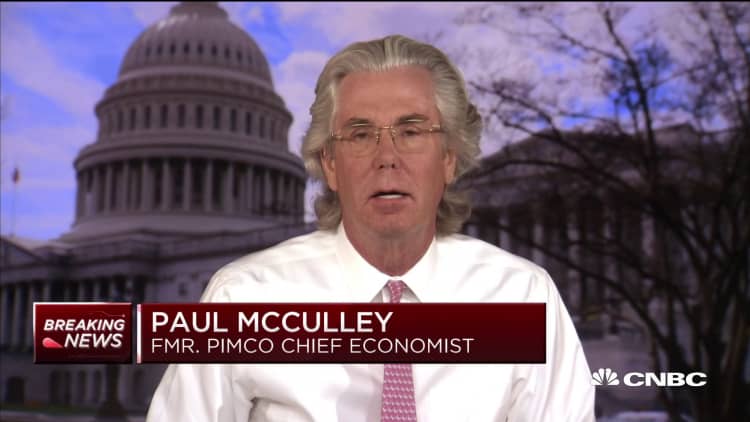
President Donald Trump has long touted market gains under his administration as an endorsement of his economic policies and, on multiple occasions, boasted about the Dow Jones Industrial Average's gains under his tenure. That was before he was blindsided by an invisible microbe.
With the coronavirus spreading economic mayhem across the globe, the Dow's steep drop on Wednesday briefly pushed the 30-stock index below the level where it closed on Jan. 19, 2017, the day before Trump took office. The sell-off is part of a historic market meltdown that has wiped out years of gains in a matter of weeks.
At session lows, Dow Industrials fell 2,319.92 points to 18,917.46 and nearly 600 points below its close of 19,732.40 a day before Trump's inauguration. A surge in major market indexes in the last 10 minutes of trading on Wednesday pushed the Dow back above its pre-inauguration levels by a thin 166 points.
The White House did not respond to CNBC's request for comment.
The blue-chip index is still more than 1,500 points, or 8.5%, above where it closed on Nov. 8, 2016, when Trump won his improbable election. His victory fanned a surge of investor optimism in anticipation of his business-friendly policies.
Stocks have plunged since mid-February as efforts to contain the coronavirus fanned fears of a global recession. The S&P 500 was more than 28% below its February high by Wednesday's close while the Dow was off its own record by more than 29%.
The recent stock market decline may prove a tough blow to Trump, who has throughout his time in office used the Dow as a proxy for the success of his economic agenda.
Most recently, Trump highlighted on March 13 an autographed chart showing the Dow spiking at approximately the same time he began an emergency coronavirus press conference.
He also tweeted on Dec. 23 that the Dow was up 55% since his election and promised — less than three months before stocks entered a bear market — that "the best is yet to come."
But Trump's fixation on day-by-day stock market is hardly new: Less than one month into his presidency he boasted on Twitter that equities had hit a new record.
"Stock market hits new high with longest winning streak in decades," he wrote on Feb. 16, 2017. "Great level of confidence and optimism - even before tax plan rollout!"
To be sure, the Dow is still about 1,500 points above where it traded the night before Trump beat Democrat Hillary Clinton. The Dow would need to fall another 8.5%, to erase all of its gains since his election. The Dow is up 7.6% since his election.
Even though Trump wasn't in charge yet, investors snapped up stocks between Election Day 2016 and his inauguration as the promise of corporate tax cuts and regulation rollback was enough for Wall Street to bet on U.S. profit growth.
The president has largely come through on his promises to lower the corporate tax rate and ease regulations on many of the nation's largest companies. Trump and Republican lawmakers passed the landmark Tax Cuts and Jobs Act in late 2017 that cut the rate U.S. corporations pay to 21% from 35%.
But now, Trump faces a new threat that he must overcome in the form of the novel coronavirus, which threatens to tip the U.S. economy into a recession and has sent the U.S. equity market spiraling deeper into a bear market throughout March.
To help combat the disease, the White House has proposed a massive, $1 trillion stimulus plan to help goose the economy. The Federal Reserve has also taken historic action by cutting the federal funds rate to zero and other measures aimed at boosting liquidity for the foreseeable future.
On Wednesday, it was announced that the Senate had enough votes to pass a bill expanding paid leave and unemployment benefits in response to the virus as part of what's expected to be a whopping governmental response to avoid economic downturn,
Senate Majority Leader Mitch McConnell said Wednesday he would vote for the plan despite what he called "real shortcomings." With the urgent need to take action, "I do not believe we should let perfection be the enemy of something that will help even a subset of workers," he said.
— CNBC's Marty Steinberg contributed to this report.
Subscribe to CNBC PRO for exclusive insights and analysis, and live business day programming from around the world.


